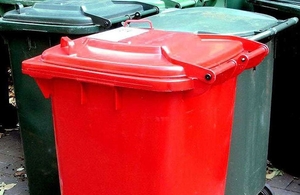‘Weekly collection saved’ as government scheme delivers for 6 million families
Local Government Secretary Eric Pickles announced that over 6 million families will keep getting a weekly bin service.

Bins
This is thanks to the government’s £250 million Weekly Collection Support Scheme.
The best 90 projects, from 85 councils, have today been selected from an over-subscribed scheme to share in the funding. Ministers are concerned that without the fund weekly bin collections could have all but disappeared by 2015, as is happening in other parts of the United Kingdom, such as Northern Ireland.
It was Disraeli’s Public Health Act 1875 which first introduced a duty on local authorities to collect rubbish; this duty was enhanced by the Public Health Act 1936 obliging councils to collect household waste weekly. Weekly collections were the norm for decades, but started disappearing from 2000 onwards.
In addition, 41 schemes will offer genuine rewards (such as shopping vouchers or loyalty points) for recycling so more families can go green without facing punitive fines and taxes, meeting an important coalition agreement pledge. It is hoped that such new schemes will encourage further take-up across the country.
The fund was set up in February to support comprehensive and cost effective weekly collections that harness innovation, use new technology and spread reward schemes to increase recycling.
Councils already receive funding for bin collections through central government formula grant and from the money raised locally via Council Tax: in total, council spending will be £114 million this year. A further 4 million households continue to provide weekly collections outside the support scheme.
Research found that two-thirds of people think frequent and regular rubbish collections are the most important feature of the waste service. Another survey found that two-thirds of the public thought government should mandate weekly collections; that weekly collections were better; and that problems with flies and smells were much worse with fortnightly collections.
Government has already scrapped bin taxes plans via the Localism Act; reversed Audit Commission rules which marked down councils for not adopting fortnightly rubbish collections; and abolished Whitehall targets which created perverse incentives to downgrade waste collection services.
The department will continue to work with Defra to spread best practice on weekly collections, challenge poor procurement or unpopular approaches.
Mr Pickles said:
“Every Englishman has a basic right to have their household rubbish taken away each and every week - it is the most visible council service people get. Yet under the previous administration weekly bin collections halved while their Council Tax bills doubled.
“Over 6 million families will breathe a sigh of relief tonight because we have put a stop to the fetid fortnightly rot and saved many weekly collections from extinction, all while increasing recycling rates by hundreds of thousands of tonnes to boot.”
Further information
- The Weekly Collection Support Scheme encourages councils to focus on 4 things: better weekly collections, cost effective bids, environmental improvements and better use of innovative ideas or technology that help residents to recycle more and do their bit for the environment. 118 councils submitted final bids. For more information, see the list of 90 winning bids, which gives a short description of what each of the schemes will do.
- Evidence: opinion research they carried out actually found that two-thirds of people think frequent and regular rubbish collections are the most important feature of the waste service. (Ipsos-MORI, ‘Weekly or fortnightly: Public attitudes to waste collections’, July 2008.)
- Fortnightly collections rose from just 13 councils across the United Kingdom in 2000 to 225 in 2008 (Alternate weekly collections conference, aspects of alternate weekly collection, July 2008). In Northern Ireland, as of 2010 to 2011, 92% of local authorities offer a fortnightly collection; in Scotland 72%, and Wales 77% according to WRAP’s, local authority waste and recycling information portal, statistics for 2010 to 2011.
- The Sauce-Icaro attitudes to waste and recycling in Great Britain, December 2011 found that two-thirds (67%) agreed with the statement the government should mandate weekly collections. Weekly collections had higher satisfaction levels than fortnightly (83% compared to 74%). Reports of problems with flies and smells for fortnightly collections were more than double that for weekly (14% compared to 6%).
- What next: in the weeks to come the department will begin working with councils, the Local Government Association and Defra to support them to work together to procure the best deals as consortiums or groups to ensure value for money for the taxpayer. This means the department has provided a synopsis of each successful bid, but will not be disclosing further specific bid details as this would have an adverse effect on competition between prospective companies and potentially put local authorities in a disadvantageous position.